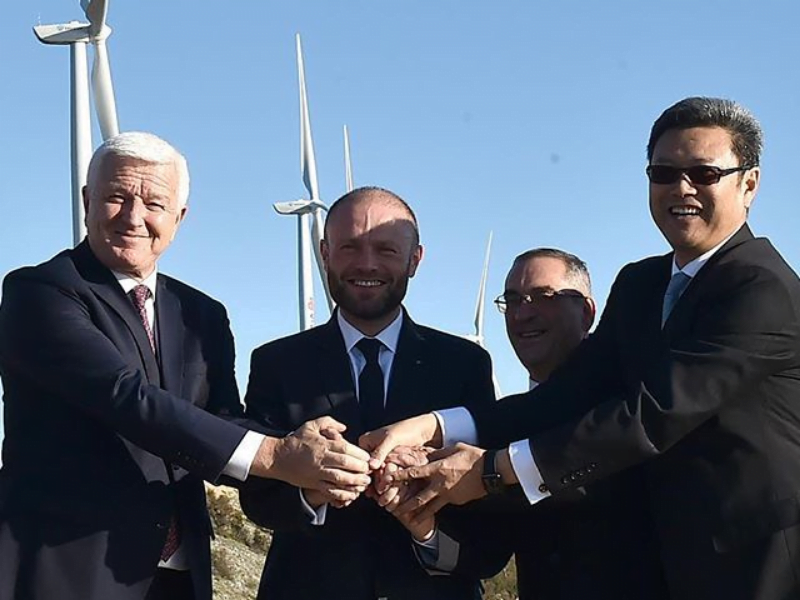-
The Mozura wind farm project was haunted by allegations of corruption from day one.
-
Intermediaries involved in the wind farm project in Montenegro tell The Shift: “Those in the government of Montenegro found the people of their kind in Malta who they could do business with and split the proceeds”.
-
We found a complex set up of offshore companies that have now become the trademark of every deal negotiated by Konrad Mizzi with Joseph Muscat and Keith Schembri’s approval.
-
The Mozura Wind farm project, originally touted in Montenegro as an investment from an EU Member State (Malta), is effectively controlled by the Chinese State thanks to Enemalta.
When an embattled Joseph Muscat went to Montenegro to open the Mozura Wind Farm together with his Montenegrin counterpart Dusko Markovic on 18 November 2019 that was to be his last foreign visit as Prime Minister of Malta.
However, Muscat and his then energy minister Konrad Mizzi, who had struck the deal with the Montenegrins in the autumn of 2015 were more than pleased with the outcome and the contents of the deal itself.
In 2015, majority State-owned Enemalta took over a Public Private Partnership (PPP) concession to install 23 horizontal axis turbines of 2MW each on a hill in Mozura in the south of Montenegro whose government leased the land for the wind park for 20 years.
Enemalta would later transfer the PPP concession once again to a China-dominated consortium in which Enemalta was only a minority shareholder.
The entire investment is reported to be worth €90 million, which is a considerable jump from the original €65 million which the government of Montenegro had initially signed with Barcelona-based Fersa Energia Renovables in 2010 for the very same deal.
Neither side explained why the price went up that much. The original Spanish investor planned to install far more expensive Siemens equipment while the Enemalta consortium chose the equipment of one of their Chinese partners, Envision Energy (a minority shareholder in the consortium).
By the time the Spaniards officially pulled the plug in February 2015, the then minister of energy Konrad Mizzi was already making his third visit to Montenegro’s capital Podgorica.
He travelled seven times in total according to a reply to a Parliamentary Question last week. Many would say that those frequent visits have paid off.
Under the terms of the PPP, the Montenegrin government agreed to subsidise the Enemalta consortium with €115.2 million in the first 12 years of the lease. On the other hand, the consortium pays just €186,057 or €0.35 per square metre per year for the lease of land.
The Montenegrins are bound to buy electricity from Mozura at three times the price of normal electricity – just as Mizzi’s Electrogas deal in Malta bound the country to buy LNG from Azerbaijani State-owned company SOCAR for 18 years at rates that are double market prices.
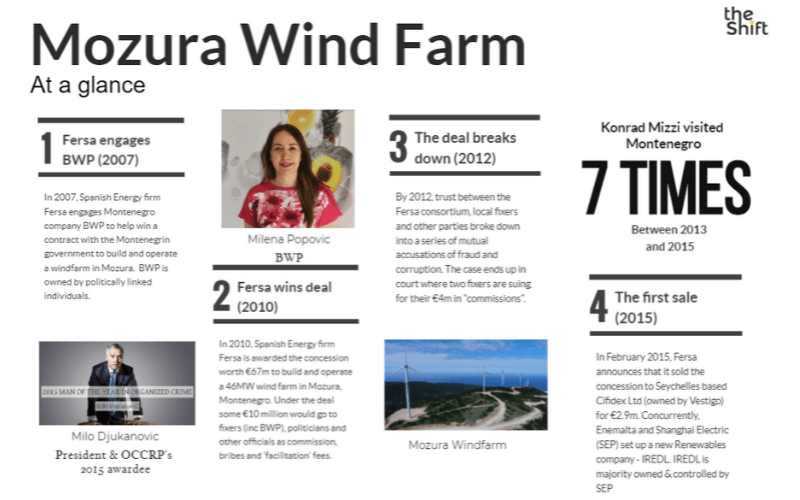
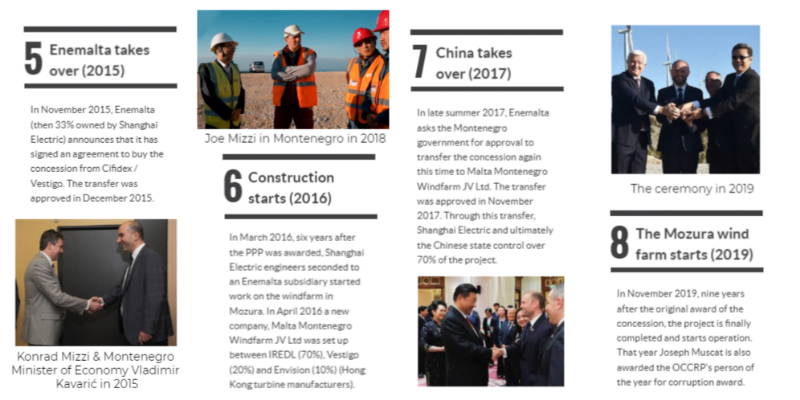
Too many local fixers, bribes and kickbacks
The Mozura project was haunted with allegations of corruption from day one.
Back in 2010, a consortium led by Spanish energy firm Fersa Energia Renovables (FER) signed a €65 million investment deal with the Montenegrin government and reportedly further pledged hidden payments of as much as €10 million, including to politicians, through an elaborate network of intermediaries.
Montenegro is notorious for corruption and organised crime and has never changed its government in democratic elections. The same Communist Party, now called Democratic Socialists, has ruled the country without interruption since the end of WWII.
Its leader Milo Djukanovic, like Muscat a past recipient of OCCRP’s Corrupt Person of the Year award (2015), has led the country since 1990 either as prime minister or president.
FER started with signing a contract with BWP Group represented by Alex Requessens (and its subsidiary firm BWP Europe Consulting SL) which company, according to the three-and-a-half-page contract seen by The Shift, was still in the process of being registered in Spain.
Under this contract, FER promised to pay a €100,000 commission for each MW built in Montenegro to BWP Montenegro (another subsidiary to be registered in Montenegro by Alex Requessens) via BWP Europe Consulting.
Since 46 MW were agreed with the Montenegrin government, the total commission was to be a hefty €4.6 million plus extra funds to “soften” Montenegro’s high officials and “speed up the necessary permits”.
The intermediaries were Carles Palou from Spain and Vladimir Popovic, a former Montenegrin football player in Spain.
On Vladimir Popovic’s suggestion, Alex Requessens appointed Milena Popovic as BWP Montenegro’s executive. Milena is a daughter of a former Montenegrin union leader, Danilo Popovic, who has close connections with the top officials.
BWP Montenegro was to obtain all permits for the project and channel an extra €4 million of bribes to top Montenegrin ministers and officials through Danilo Popovic, according to one of the intermediaries who spoke to The Shift.
Furthermore, according to the payment chart shown to The Shift, the former president of FER Jose Maria Roger Ezpeleta was to receive €2 million commission, while Carles Palou, Vladimir Popovic, Alex Requessens, Marc Requessens and Milena Popovic were to get €800,000 each.
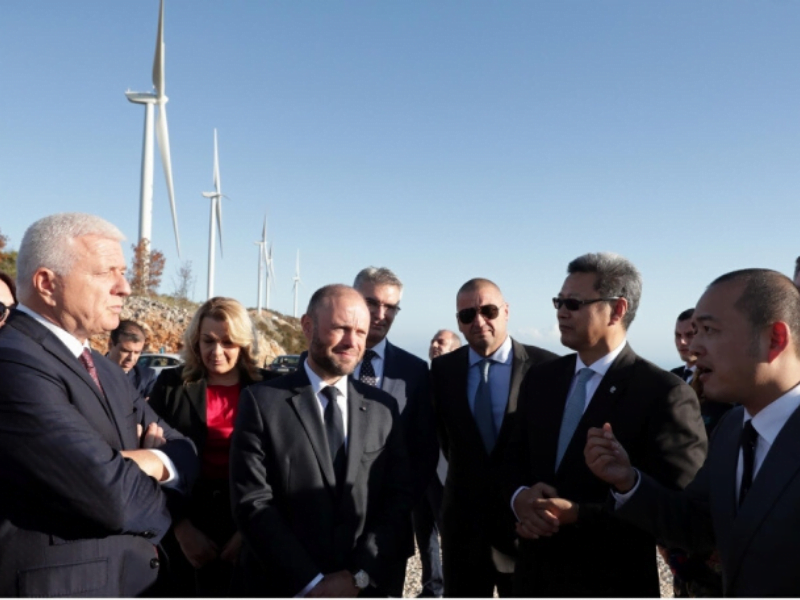
A project doomed to fail
Unsurprisingly, given the number of people set to take commissions, kickbacks or bribes for just one deal, things soon went wrong.
FER only paid the first instalment of €580,000 upon signing the deal with the government of Montenegro through the BWP companies founded by Alex Requessens. The former football player Vladimir Popovic received less than €20,000 while just over half a million euros went to the former union leader and his daughter to pass them to the right people in the government. Given this imbalance, the fixers and intermediaries started to accuse each other of fraud and dishonesty.
Vladimir Popovic and his Spanish partner Carles Palou filed fraud charges in late 2012 before a district court in Montenegro against FER, BWP Europe Consulting and BWP Montenegro and asked for €2 million in damages each.
Fersa retorted that the entire business was conducted through BWP Europe Consulting only and that FER had no business with BWP Montenegro nor promised hefty commissions and bribes to officials.
On the other hand, the plaintiffs produced a document from Spain that BWP Europe Consulting’s registration was never completed in Spain so Fersa signed a contract and was doing business with a company that actually never existed.
Moreover, BWP Montenegro was closed down before the trial for fraud in Montenegro even began so the court rejected the charges against BWP Montenegro on the basis that it was not active anymore.
The court case is still languishing in court.
Enemalta gets involved – but China takes it over
Despite the FER consortium breaking down into mutual accusations of corruption and fraud, it seems Montenegrin officials were keen to see this project through.
One of the intermediaries that The Shift spoke to on condition of anonymity said, “those in the government (of Montenegro) found the people of their kind (in Malta) who they could do business with and split the proceeds”.
The story didn’t end with Konrad Mizzi’s shaking hands with his Montenegrin counterpart Vladimir Kavaric in November 2015 when they signed “the transfer of the agreement on the lease of land and construction” of the Mozura Wind Park Podgorica Ltd registered in Montenegro.
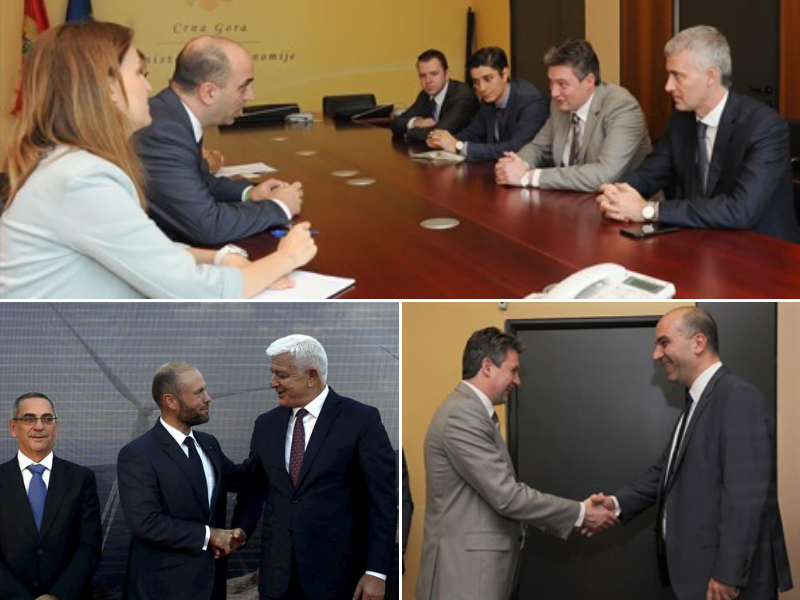
Former Energy Minster Konrad Mizzi in Montenegro with Montenegrin Economy Minister Vladimir Kavaric.
The Mozura Wind Park was previously owned by the Spanish Fersa which sold it to Cifidex Ltd from The Seychelles in February 2015 for €2.9 million.
Cifidex Ltd was registered in Guernsey, one of Britain’s Channel Islands and a haven for offshore business. Fersa had initially claimed in a stock exchange announcement that Cifidex was a subsidiary of Vestigo Capital then later retracted it without clarifying whether Cifidex had any other relationship with Vestigo Capital.
In feedback sent to the Shift, Vestigo Capital has said there is no connection whatsoever between Cifidex Ltd and Vestigo Capital.
The construction of the wind farm began in March 2016.
However, on 4 September 2017, the government of Montenegro approved yet another change of ownership in Mozura Wind Park Ltd (until then entirely owned by Enemalta plc).
After the change, Enemalta plc retained just 10% in Mozura Wind Park Ltd while 90% was transferred to Malta Montenegro Wind Power JV Ltd registered in Malta.
Malta Montenegro Wind Park JV is majority-owned by International Renewable Energy Development Limited (IREDL) – a company in turn owned and controlled by Shanghai Electric (as to 66%) and Enemalta (33%). Alongside IREDL, Guernsey-based Vestigo Clean Energy I Limited has 20% (a fund controlled by the above Vestigo Capital) and Hong-Kong based Envision Energy International Limited has 10%.
As a result of this latest transfer, the Mozura Wind farm project, originally touted in Montenegro as an investment from an EU member state, is effectively controlled by the Chinese State and is in fact paraded by the Chinese government as an example of China’s Belt and Road initiative.
“Since both of them (Djukanovic and Muscat) are in love with offshore business something was fishy from the start. Each time capital investment is conducted through offshore companies then you know that something stinks in Montenegro” Vasilije Milickovic, a representative of minority shareholders of State-owned Electrical Utility of Montenegro (EPCG) and a vocal critic of the government, said in an interview with The Shift.
He said he wrote a letter to Joseph Muscat a month ago asking him to pull out of his private project with Milo Djukanovic. “I asked him to go and sell that insanely expensive electricity to the Italians or to his own Maltese if he dared. Ordinary people have no interest to pay electricity of 9.6c/kwh which is three times the market price. It’s very clear who benefits from this kind of criminal deal.”

